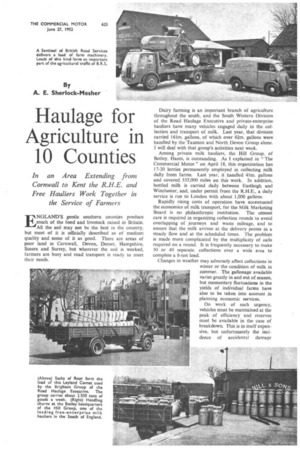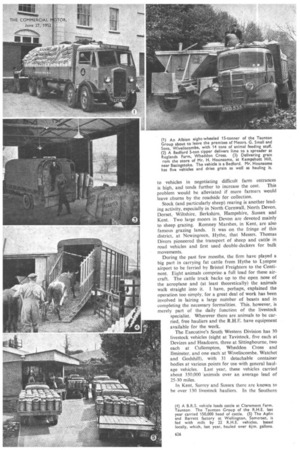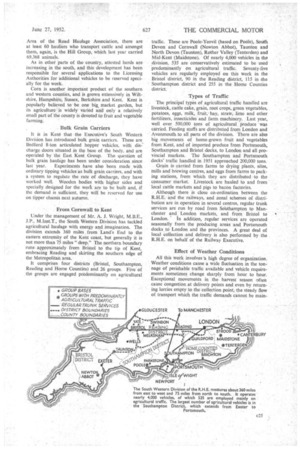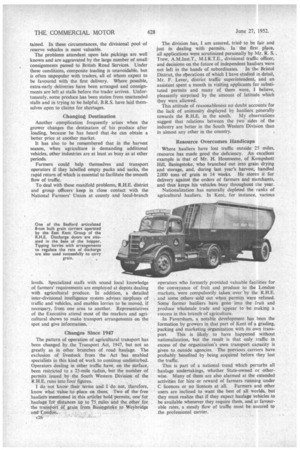Haulage for
Page 75

Page 76

Page 83

Page 84

If you've noticed an error in this article please click here to report it so we can fix it.
Agriculture in
10 Counties
In an Area Extending from Cornwall to Kent the R.H.E. and Free Hauliers Work Together in the Service of Farmers
By A. E. Sherlock-Mesher
ENGLAND'S gentle southern counties produce much of the food and livestock raised in Britain. All the soil may not be the best in the country, but most of it is officially described as of medium quality and some of it as good. There are areas of poor land in Cornwall, Devon, Dorset, Hampshire, Sussex and Surrey, but wherever the soil is worked, farmers are busy and road transport is ready to meet their needs.
Dairy farming is an important branch of agriculture throughout the south, and the South Western Division of the Road Haulage Executive and private-enterprise hauliers have many vehicles engaged daily in the collection and transport of milk. Last year, that division carried 161m. gallons, of which over Rm. gallons were handled by the Taunton and North Devon Group alone. I will deal with that group's activities next week.
Among private milk hauliers, the Hill Group, of Botley, Hants, is outstanding. As I explained in The Commercial Motor" on April 18, this organization has 17-20 lorries permanently employed in collecting milk daily from farms. Last year, it handled 41m. gallons and covered 335,000 miles on this work. In addition, bottled milk is carried daily between Eastleigh arid Winchester, and, under permit from the R.H.E., a daily service is run to London with about 1,000 gallons.
Rapidly rising costs of operation have accentuated the economics of milk transport, for the Milk Marketing Board is no philanthropic institution. The utmost care is required in organizing collection rounds to avoid overlapping of journeys and waste mileage, and to ensure that the milk arrives at the delivery points in a steady flow and at the scheduled times. The problem is made more complicated by the multiplicity of calls required on a round. It is frequently necessary to make 30 or 40 separate collections over a wide area to complete a 6-ton load.
Changes in weather may adversely affect collections in winter or the condition of milk in summer. The gallonage available varies greatly in and out of season, but momentary fluctuations in the yields of individual farms have also to be taken into account in planning economic services.
On work of such urgency, vehicles must be maintained at the peak of efficiency and reserves must be available in the case of breakdown. This is in itself expensive, but unfortunately the incidence of accidental damage to vehicles in negotiating difficult farm entrances is high, arid tends further to increase the cost. This problem would be alleviated if more farmers would leave churns by the roadside for collection. Stock (and particularly sheep) rearing is another leading activity, especially in North Cornwall, North Devon, Dorset, Wiltshire, Berkshire, Hampshire, Sussex and Kent. . Two large moors in Devon are devoted mainly to sheep grazing. Romney Marshes, in Kent, are also famous grazing lands. It was on the fringe of this district, at Newingreen, Hythe, that Messrs. Thomas Divers pioneered the transport of sheep and cattle in road vehicles and first used double-deckers for bulk movements.
During the past few months, the firm have played a big part in carrying fat cattle from Hythe to Lympne airport to be ferried by Bristol Freighters to the Continent. Eight animals comprise a full load for these aircraft. The cattle truck backs up to the open nose of the aeroplane and (at least theoretically) the animals walk straight into it. I have, perhaps, explained the operation too simply, for a great deal of work has been involved in Iairing a large number of beasts and in completing the necessary formalities. This, however, is merely part of the daily function of the livestock specialist. Wherever there are animals to be carried, free hauliers and the R.H.E. have equipment available for the work.
The Executive's South Western Division has 30 livestock vehicles (eight at Tavistock, five each at Devizes and Headcorn, three at Sittingbourne, two each at Cullorripton, Wheddon Cross and Ilminster, and one each at Wiveliscombe, Watchet and Godshill), with 31 detachable container bodies at various points for use with general haulage vehicles. Last year, these vehicles carried about 350,000 'animals over an average lead of 25-30 miles.
In Kent, Surrey and Sussex there are known to be over 130 livestock hauliers. In the Southern Area of the Road Haulage Association, there are at least 60 hauliers who transport cattle and amongst them, again, is the Hill Group, which last year carried 69,368 animals.
As in other parts of the country, attested herds are increasing in the south, and this development has been responsible for several applications to the Licensing Authorities for additional vehicles to be reserved specially for the work.
Corn is another important product of the southern and western counties, and is grown extensively in Wiltshire, Hampshire, Sussex, Berkshire and Kent. Kent is popularly believed to be one big, market garden, but its agriculture is widely varied and only a relatively small part of the county is devoted to fruit and vegetable farming.
Bulk Grain Carriers It is in Kent that the Executive's South Western Division has introduced bulk grain carriers. These are Bedford 8-ton articulated hopper vehicles, with discharge doors situated in the base of the body, and are operated, by the East Kent Group. The question of bulk grain haulage has been under consideration since last year. Experiments have also been made , with ordinary tipping vehicles as bulk grain carriers, and with a system. to regulate the rate of discharge; they have worked well. Wooden bodies with higher sides and specially.designed for the work are to be built and, if the demand is sufficient, they will be reserved for use on tipper chassis next autumn.
From Cornwall to Kent Under the management of Mr. A. J. Wright, M.B.E., I.P., M.Inst.T., the South Western Division has tackled agricultural haulage with energy and imagination. The division extends 360 miles from Land's End to the eastern extremity of the Kent coast, but generally it is not more than 75 miles " deep." The northern boundary runs approximately from Bristol to the tip of Kent, embracing Reading and skirting the southern edge of the Metropolitan area.
It comprises four districts (Bristol, Southampton, Reading and Home Counties) and 26 groups. Five of the groups are engaged predominantly on agricultural traffic. These are Poole-Yeovil (based on Poole), South Devon and Cornwall (Newton Abbot), Taunton and North Devon (Taunton), Rother Valley (Tenterden) and Mid-Kent (Maidstone). Of nearly 4,000 vehicles in the diVision, 535 are conservatively estimated to be used predominantly on agricultural traffic. Seventy-five vehicles are regularly employed on this work in the Bristol district, 90 in the Reading district, 115 in the Southampton district and 255 in the Home Counties district.
• Types of Traffic The principal types of agricultural traffic handled are livestock, cattle cake, grain, root crops, green vegetables, potatoes, eggs, milk, fruit,. hay, straw, lime and other fertilizers, insecticides and farm machinery. Last year, well over 500,000 tons of agricultural produce ' was carried. Feeding stuffs are distributed from London and Avonmouth 10 all parts of the division. There are also big movements of home-grown fruit and vegetables from Kent, and of imported produce from Portsmouth, Southampton and Bristol docks, to London and all provincial markets. The Southampton and Portsmouth docks' traffic handled in 1951 approached 200,000 tons.
Grain is carried from farms to drying plants, silos, mills and brewing centres, and eggs from farms to packing stations, from which they are distributed 'to the consumer market. Livestock are hauled to and from • local cattle markets and pigs to bacon factories.
Although there is close co-ordination between the R.H.E. and the railways, and zonal schemes of distribution are in operation in several centres, regular trunk services are run by road from Sobtharnpton to Manchester and London markets, and from Bristol to London. in addition, regular services are operated seasonally from the producing areas and Portsmouth docks to London arid the provinces. A great deal of local collection and delivery is also performed by the R.H.E. on behalf of the Railway Executive.
Effect of Weather Conditions All this work involves a high degree of organization.
• Weather conditions cause a wide fluctuation in the tonnage of perishable traffic available and vehicle requirements sometimes change sharply from hour to hour. Exceptional movements in• the harvest season often cause congestion at delivery points and even by return. ing lorries empty to the collection point, the steady flow of transport which the traffic demands cannot be main tamed. In these circumstances, the divisional pool of reserve vehicles is most valuable.
The problems attendant upon late pickings are well known and are aggravated by the large number of small consignments passed to British Road Services. Under these conditions, composite loading is unavoidable, but is often unpopular with traders, all of whom expect to be favoured with the first delivery. Where possible, extra-early deliveries have been arranged and consignments are left at stalls before the trader arrives. Unfortunately, some produce has been stolen from unattended stalls and in trying to be helpful, B.R.S. have laid themselves open to claims for shortages.
Changing Destination Another complication frequently arises when the grower changes the destination of his produce after loading, because he has heard that .he can obtain a better price at another market.
It has also to be remembered that in the harvest season, when agriculture is demanding additional vehicles, other industries are at least as busy as at other periods.
Farmers could help themselves and transport operators if they labelled empty packs and sacks, the rapid return of which is essential to facilitate the smooth flow of traffic.
To deal with these manifold problems, R.H.E. district and group officers keep in close contact with the National Farmers' Union at county and local-branch levels. Specialized staffs with sound local knowledge of farmers' requirements are employed at depots dealing with agricultural produce. In addition, a detailed inter-divisional intelligence system advises surpluses of traffic and vehicles, and enables lorries to be moved, if necessary, from one area to another. Representatives of the Executive attend most of the markets and agricultural shows to make transport arrangements on the spot and give information.
Changes Since 1947 The pattern of operation of agricultural transport has been changed by the Transport Act, 1947, but not so greatly as in other. branches of road haulage. The exclusion of livestock from the Act has enabled specialists in this kind of. work to continue undisturbed. Operators dealing in other traffic have, on the surface, been restricted to a 25-mile radius, but the number of permits issued by. the South Western Division of the R.H.E. runs into four figures.
I do not know their terms and I do not, therefore, know what -value to place on thorn. Two of the free hauliers mentioned in:this articles hold permits, one` frithaulage for distances up to 75 miles and the other' for the transport of grain from Basingstoke to Weybridge and London.
c26 The division has, I am assured, tried to be fair and just in dealing with permits. In the first place, all applications were scrutinized personally by Mr. R. S. Trew, A.M.Inst.T., M.I.R.T.E., divisional traffic officer, and decisions on the future of independent hauliers were not left in the hands of subordinates. In the Bristol District, the operations of which I have studied in detail, Mr. F. Lever, district traffic superintendent, and an assistant spent a month in visiting applicants for substituted permits and many of them were, I believe, pleasantly surprised by the amount of latitude which they were allowed.
This attitude of reasonableness no doubt accounts for the lack of animosity displayed by hauliers generally towards the R.H.E. in the south. My observations suggest that relations between the two sides of the industry are better in the South Western Division than in almost any other in the country.
Resource Overcomes Handicaps Where hauliers have lost traffic outside 25 miles, resource has made good the deficiency. An excellent example is that of Mr. H. Hounsome, of Kempshott Hill, Basingstoke, who branched out into grain drying and storage, and, during last year's harvest, handled 2,000 tons of grain in 14 weeks. He stores it for delivery against the orders of farmers and merchants, and thus keeps his vehicles busy throughout the year.
Nationalization has naturally depleted the ranks of agricultural hauliers. In Kent, for instance, various operators who formerly provided valuable facilities for the conveyance of fruit and produce to the London markets, were compulsorily taken over by the R.H.E. and some others sold out when permits were refused. Some former hauliers have gone into the fruit and produce wholesale trade and appear to be making a success in this branch of agriculture.
In Faversham, a notable development has been the formation by growers in that part of Kent of a grading, packing and marketing organization with its own trans port. This is likely to have happened without nationalization, but the result is that only traffic in excess of the organization's own transport capacity is given to outside agencies. The previous carriers have probably benefited by being acquired before they lost the traffic.
This is part of a national trend which perturbs all haulage undertakings, whether State-owned or otherwise. Many of them are also alarmed at the extended activities for hire or reward of farmers running under C licences or no licences at all. Farmers and other users are inclined to want the best of all worlds, but they must realize that if they expect haulage vehicles to be available whenever they require them, and at favourable rates, a steady flow of traffic must be assured to the professional carrier.
















































































































































